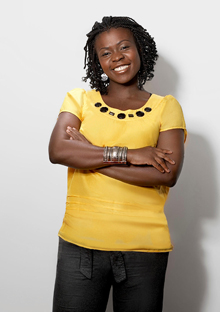Missions Accomplished: O's Leadership Project One Year Later

Photo: Ben Goldstein/Studio D
PAGE 2
Raolat Abdulai's Women Rule! Takeaway
Always be ready to rethink the plan.When it comes to healthcare, something revolutionary is happening in Washington, D.C.—and not on Capitol Hill. Just beyond the double doors of Howard University Hospital, in the city's LeDroit Park neighborhood, a brand-new clinic is providing free health and social services to uninsured patients, all thanks to a fourth-year medical student named Raolat Abdulai.
"I'm going to come there and make a difference," Abdulai had written in her application to Howard University College of Medicine, where she was accepted in 2006. Born in Nigeria (her family moved to Maryland when she was 5), she devised a plan to open the student-run clinic during her second year of med school. She wanted it to provide comprehensive services to patients lacking insurance—including assistance with mental health issues, housing, food, and transportation—and also give future doctors practice in delivering holistic, compassionate care. Her professors were enthusiastic, and Abdulai quickly assembled a planning committee of fellow medical students from Howard, Georgetown, and George Washington universities; together, she imagined, they would organize the jointly run clinic.
But even scheduling a meeting with the time-pressed students from all three schools proved nearly impossible. Between the logistical challenges and a lack of funding, Abdulai's project had all but flatlined when she won a place at Women Rule!, where she says she learned two valuable skills: the ability to write a business plan and the art of adaptation. "One of the speakers told us, 'If you have a plan that isn't working, shift your approach. Even if it's not how you originally envisioned getting there, it's going to help you reach the finish line.'"
After the conference, Abdulai decided to pare down her volunteer pool. Instead of reaching out to three schools for students, she narrowed her focus to Howard. She contacted the school's alumni for donations, and in addition received $30,000 from the Association of American Medical Colleges Caring for Community Grant program. Once the money was in place, she enlisted the help of a few Howard MBA students to wrangle the financials. Finally, after finding a site in the hospital's outpatient center, an attending physician to supervise all patient care, and two dozen willing volunteers, Abdulai opened her clinic in June.
It was a meteoric accomplishment, especially on top of going to medical school. But bafflingly, after all that hard work—the planning, the passion, the effort—the patients didn't come. "I was so disappointed," Abdulai says. "We thought everything was fine, and then it just...it just didn't work." That's when she remembered the "stay flexible" message. And she realized that the clinic's location, in the depths of the hospital, was too out-of-the-way for the patients it was meant to serve—primarily walk-ins. So she moved it just off the hospital's main 5th Street entrance.
Today patients fill the spacious waiting area. When one arrives, medical students take her history before her case is presented to the attending physician. Each patient is also assessed for social needs and connected with health insurance, housing, and food services. A medical student follows up after she leaves.
Patient feedback has been so positive that Abdulai is already considering ways to expand. Howard medical students are lining up to participate. "If it wasn't for the conference," says Abdulai, who has decided to pursue internal medicine, "I'd probably still be running in place."



